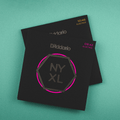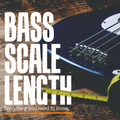What are the best electric guitar strings for beginners?
By Strings Direct – 29 August, 2023

When you’ve just started playing the electric guitar the time will inevitably come when you need to change your strings. We’re well aware that if you’ve never bought a set of electric guitar strings before, the guitar string landscape can be very confusing. So many numbers, so many brands, information overload! It can have you running for the hills! But fear not, we’ve created this guide on which electric guitar strings are best for beginners to help point you in the right direction. Let’s get cracking!........
FIRST THING'S FIRST
Most crucially, it’s important to ensure you are buying strings that are tailored for your particular instrument. If you have an electric guitar, make sure you buy electric guitar strings. Likewise, if you have an acoustic guitar, stick to acoustic guitar strings. This is probably a very obvious point that is no way meant to be patronising, however, as you continue your guitar journey you’ll see that there are distinct differences between sets that have been designed for specific instruments so it’s best to ensure you have the right strings for the job at hand.
SO WHICH SET TO GO FOR
Well, our advice would always be to keep it simple and stick to one of the bigger named brands when you first start out. You may have heard of names such as D’Addario, Ernie Ball, Rotosound, Fender etc. These brands are some of the biggest names in the string world, and there’s a good reason for this.... they make great strings! Their quality is consistent, they sound great and are reasonably priced. They suit a wide variety of playing styles too, so by choosing a set from one of these major brands you won’t go too far wrong.
As added assurance, many professional players and rock stars swear by these brands so you’ll be in good company if you choose to use these strings too!!

GAUGE IS KING
Brand is just the tip of the iceberg when it comes to choosing strings and there are plenty of other facets of strings for you to make a choice on. However, we feel it can be unnecessarily distracting to get bogged down with these elements when you’re first starting out. Instead, if there’s one area of electric guitar strings that you need to be concerned with, it’s the gauge of strings you choose. But what exactly does string gauge mean?
WHAT IS STRING GAUGE?
Put simply, string gauge refers to how thick our strings are. Each string on our guitar has a numerical value that represents exactly how thick it is e.g. .009”, .010”, .011” etc. (measured in thousandths of an inch). In the string world, it’s common practice to omit the decimal places so you’ll often see the numbers simply written as 9, 10, 11 and so on. The higher the number, the thicker the string will be. As an example, a standard set of electric guitar strings may contain the following gauges;
9, 11, 16, 24, 32, 42
The ‘9’ represents the gauge of the thinnest string (aka 1st string) and the ‘42’ denotes the thickest string (aka 6th string).
As you scour our website, you’ll often see the gauges of sets written as 09-42, 09-46, 10-46, 11-49 etc. Instead of quoting each individual gauge in the set, strings manufacturers often show the gauges of the thinnest and thickest strings to give a broader overview of the gauge.

WHICH GAUGE SHOULD YOU CHOOSE?
Ah, the million dollar question!! If you’re partial to reading guitar forums, it’ll seem as though everybody and their dog has an opinion on what string gauge is the best to use.
As a beginner to the electric guitar, our advice would always be to start with a thinner (lighter) gauge such as 09-42, 09-46 or 10-46.
“But why should I start with a thin gauge? I’ve heard that thicker strings sound much better!”
This is a common argument you’ll hear amongst guitar players and whilst this is a plausible opinion, we still profess that starting off with a lighter gauge will set you on the right path in your guitar playing career. Allow us to explain….

- Thinner strings have less tension in them meaning that fretting notes, bending the strings and moving around the fretboard requires less effort than if you were to use a thicker gauge set.
- As a beginner, your fingertips will inevitably be a bit tender for the first few months. Over time, the skin around the tips of your fingers will harden and the muscles in your hands will strengthen, so any initial discomfort quickly subsides. However, selecting a lighter gauge will certainly make these initial stages easier on your hands whilst you’re pushing through any pain barrier!
- A lighter gauge also allows you to focus on improving your technique and can help prevent you from developing bad habits. The early stages of learning the guitar can be frustrating, so it’s important to be able to enjoy the early stages of learning without something like painful hands hindering your progress or discouraging you from picking up your guitar. This is particularly relevant for younger players just starting out. Any discomfort will no doubt see their guitar being swapped for their X-Box and nobody wants to see that!
WE COULD BE HEREOS?
Seeing our heroes up on the stage is probably one of the main reasons we’re drawn to pick up the guitar. As a result, we often like to mimic the gear that they use, even down to their strings. In a lot of cases they will probably use ‘heavier’ gauges than the ones we’ve suggested above. Whilst it’s great to emulate your heroes, we’d advise being reluctant to dive straight into using the same gauges they do… after all, they’ve been playing for years and will have built up plenty of experience in playing heavier strings.
Using a set of 12-52 strings (FYI that’s pretty heavy!) straight out of the blocks may seem tempting, but trust us, your technique and the muscles in your hands will be forever thankful if you bide your time.
Once you’ve been playing for a bit longer and become more experienced, feel free to start experimenting with heavier gauges. As you start delving into the world of string gauges you’ll see that there’s so many to choose from. In fact, many of the big brands have started to produce half-gauge sets such as 8.5-39, 9.5-44 and 10.5-48. These ‘in between’ sets help to make the transition from one gauge up to another that little bit easier. Of course, you can go lighter if you wish, eg from a set of 9-42 down to 8-38, with Jim Dunlop even making a 7-38 gauge set (super light).

If you want a bit more information on light gauge strings check out our blog post from a few years back here. Of course, if you need some more information on string gauge you can also check out our String Gauge 101 blog post.
NUMBERS NOT WORDS
We know that we’ve spoke extensively about string gauge here. However, there’s another little key piece of advice we’d like to pass on.
As you start to look further into strings, you’ll notice that string manufacturers often use terms such as ‘extra light’, ‘light’, ‘medium’ etc. to help give a more descriptive meaning to their gauges. On the face of it, this sounds very helpful (particularly for beginners) however, these names can often be the cause of confusion, particularly when trying to compare gauges between different brands.

The confusion arises because not all manufacturers use the same names for the same gauges. For example, one brand may refer to their 10-46 set as ‘Light’, another may call their 10-46 set ‘Medium Light’ whilst another brand could describe theirs as ‘Medium’.... all very confusing! The fact of the matter is that if all three sets are 10-46 gauge, then all three sets are the same thickness, regardless of what name they have been assigned by the brand.
Our advice here is to concentrate on the numbers (not the descriptive words) as this will give the most accurate representation of the thickness of the set. For more information on this topic, you can read our blog post 'Gauge is just a number'
**TIP** Another little tip for you - when you change your strings, be sure to keep the outer packaging of your new set in your guitar case. That way, when it comes to buying your next set, you’ll know exactly what gauge you currently have on your guitar.
COATED STRINGS
One final bit of advice we’d offer guitarists who are just starting out is to start by using a set of uncoated strings.
Coated strings have been a fantastic invention. These strings have microscopically thin liquid polymers applied to their outer surface that prevent acidic sweat and other nasties from corroding the strings and dulling their tone prematurely. As a result, coated strings can last upto 3-5 times longer than ordinary uncoated strings.
Whilst we love coated strings here at Strings Direct, the extra lifespan means that months (possibly longer) can pass before you need to change your strings. We always encourage new players to learn how to change their own strings, so, although uncoated strings lose their tone quicker than coated strings, you’ll reap the benefits of getting more practice in changing your strings. This isn’t absolutely essential, but just a thought you may wish to consider!
If you need some advice on how to change your electric guitar strings, be sure to check out our videos on how to do this here;
CONCLUSION
We hope that this blog post has given you a thorough insight into which types of electric strings are best suited for beginner guitar players. In short, if you stick to a good brand and a gauge that’s on the lighter side, you’ll be well on your way.
There’s plenty of information to take in here so if you still feel a little bemused we’ve listed a few sets below that will be suitable options to start with. Simply click the links and you’ll be directed towards our website.
Of course, if you need any further advice, please don’t hesitate to get in touch with us. Our staff are knowledgeable and always happy to offer our advice where we can. You can call us on 01702 540068 or you can email us at info@stringsdirect.co.uk.
SUGGESTED STRINGS SETS FOR ELECTRIC GUITAR BEGINNERS
9-42 GAUGE SETS
Ernie Ball 09-42 Super Slinky Electric Guitar Strings
D’Addario EXL120 09-42 Electric Guitar Strings
Rotosound Pinks 09-42 Electric Guitar Strings
Fender Super 250 09-42 Electric Guitar Strings
Legacy 09-42 Electric Guitar Strings
10-46 GAUGE SETS
Ernie Ball 10-46 Regular Slinky Electric Guitar Strings
D’Addario EXL110 10-46 Electric Guitar Strings
Rotosound 10-46 Yellows Electric Guitar Strings
Fender Super 250 10-46 Electric Guitar Strings
Legacy 10-46 Electric Guitar Strings





